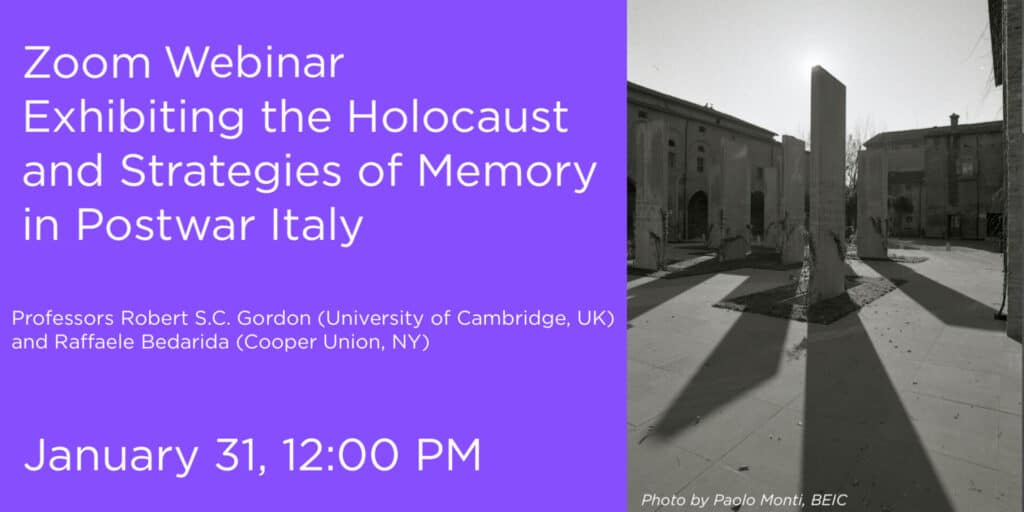Exhibiting the Holocaust and Strategies of Memory in Postwar Italy
January 31, 2022

Every year the Consulate General of Italy in New York together with the Centro Primo Levi, the Italian Cultural Institute, Casa Italiana Zerilli Marimò at NYU, the Italian Academy at Columbia University, the Calandra Institute at CUNY, the Scuola d’Italia Guglielmo Marconi, Magazzino Italian Art and the Center for Italian Modern Art commemorate the victims of the Nazi-Fascist persecution with a series of cultural initiatives aimed at preserving the memory of those events and educating the younger generations, while raising awareness of racism and xenophobia.
On the occasion of the official commemorations for the 2022 International Holocaust Remembrance Day, celebrated in Italy as the Giorno della Memoria, CIMA presents a panel with Professors Robert S.C. Gordon (Cambridge University, UK) and Raffaele Bedarida (Cooper Union, New York), who will discuss their recent research on the memorialization of the Holocaust in the context of Italian public monuments and memorials. Prof. Gordon will examine the tensions and creativity that underpinned the creation of the Museo Monumento del Deportato in Carpi and the Memoriale italiano di Auschwitz, while Prof. Bedarida will focus on the Holocaust drawings by Corrado Cagli, a Jewish Italian artist who enlisted with the American army and took part in the liberation of the Buchenwald concentration camp.
The event will take place as a Zoom webinar, free to the public.
About the speakers:
Robert S. C. Gordon is Serena Professor of Italian at Cambridge University. He works on the literature, cinema and cultural history of modern Italy. He is the author or editor of a number of books, including a study of the writer and filmmaker Pier Paolo Pasolini (Pasolini. Forms of Subjectivity) and several volumes on the work of Primo Levi (e.g. Primo Levi’s Ordinary Virtues, Auschwitz Report, The Cambridge Companion to Primo Levi, Innesti). He has also published on the wider field of post-war cultural responses to the Holocaust, in the book The Holocaust in Italian Culture, 1944-2010, the co-edited collection Holocaust Intersections anda co-edited special issue of the Jewish history journal Quest. He is also co-editor of Culture, Censorship and the State in 20th-Century Italy and his work on cinema includes the book onPasolini, the BFI Film Classics volume Bicycle Thieves, DVD and Blu-ray audio commentaries, and articles and essays on diverse topics including Holocaust cinema, early film and literature, Antonioni, ‘Hollywood on the Tiber’, and Gianfranco Rosi. He is the author of a general account of modern Italian literature, A Difficult Modernity: An Introduction to Twentieth-Century Italian Literature. He has taught at Oxford and Cambridge Universities, is a former Senior Editor of the journal Italian Studies, and was elected Fellow of the British Academy in 2015.
Raffaele Bedarida is an Associate Professor of Art History at Cooper Union, New York where he coordinates the History and Theory of Art program. An art historian and curator specializing in twentieth-century Italian art and politics, Bedarida focuses on cultural diplomacy, migration, and cultural exchange between Italy and the United States. He is the author of two monographs, Bepi Romagnoni: Il Nuovo Racconto (Silvana Editoriale, 2005) and Corrado Cagli: La pittura, l’esilio, l’America (Donzelli, 2018 – English edition upcoming). He has published extensively in periodicals and edited volumes, including The International Yearbook of Futurism Studies, Oxford Art Journal, Tate Modern’s In Focus, and Artforum. For his work on the exchange between Italy and the U.S., Bedarida has received fellowships from the Center for Italian Modern Art (CIMA) and the Terra Foundation for American Art. He currently serves as a member of the advisory committee of the Massimo Campigli Archives, the Archivio Crispolti Arte Contemporanea and as the co-chair of the European Postwar and Contemporary Art Forum. His monograph, entitled Exhibiting Italian Art in the United States from Futurism to Arte Povera: Like a Giant Screen will soon be published by Routledge.
Public Programming at CIMA is made possible with the generous support of Christie’s.

